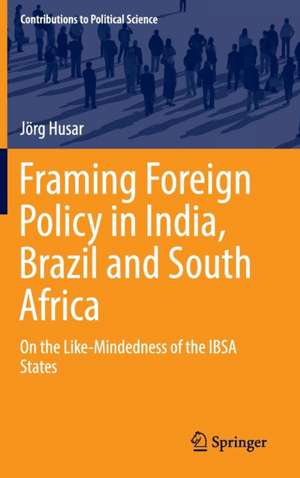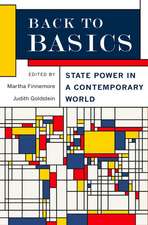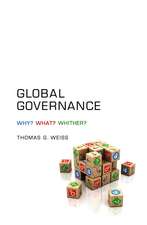Framing Foreign Policy in India, Brazil and South Africa: On the Like-Mindedness of the IBSA States: Contributions to Political Science
Autor Jörg Husaren Limba Engleză Hardback – 13 mai 2016
| Toate formatele și edițiile | Preț | Express |
|---|---|---|
| Paperback (1) | 386.99 lei 43-57 zile | |
| Springer International Publishing – 27 mai 2018 | 386.99 lei 43-57 zile | |
| Hardback (1) | 394.29 lei 43-57 zile | |
| Springer International Publishing – 13 mai 2016 | 394.29 lei 43-57 zile |
Din seria Contributions to Political Science
- 18%
 Preț: 724.17 lei
Preț: 724.17 lei - 24%
 Preț: 633.39 lei
Preț: 633.39 lei - 17%
 Preț: 524.54 lei
Preț: 524.54 lei - 15%
 Preț: 583.61 lei
Preț: 583.61 lei -
 Preț: 380.63 lei
Preț: 380.63 lei - 15%
 Preț: 471.69 lei
Preț: 471.69 lei - 18%
 Preț: 780.82 lei
Preț: 780.82 lei - 18%
 Preț: 785.86 lei
Preț: 785.86 lei -
 Preț: 379.86 lei
Preț: 379.86 lei - 15%
 Preț: 695.85 lei
Preț: 695.85 lei -
 Preț: 390.84 lei
Preț: 390.84 lei - 18%
 Preț: 777.50 lei
Preț: 777.50 lei -
 Preț: 387.75 lei
Preț: 387.75 lei - 18%
 Preț: 791.71 lei
Preț: 791.71 lei - 15%
 Preț: 635.15 lei
Preț: 635.15 lei -
 Preț: 381.42 lei
Preț: 381.42 lei - 18%
 Preț: 798.66 lei
Preț: 798.66 lei -
 Preț: 392.37 lei
Preț: 392.37 lei -
 Preț: 391.02 lei
Preț: 391.02 lei -
 Preț: 359.76 lei
Preț: 359.76 lei - 18%
 Preț: 788.90 lei
Preț: 788.90 lei -
 Preț: 387.58 lei
Preț: 387.58 lei -
 Preț: 395.47 lei
Preț: 395.47 lei - 20%
 Preț: 579.41 lei
Preț: 579.41 lei - 15%
 Preț: 643.34 lei
Preț: 643.34 lei -
 Preț: 384.86 lei
Preț: 384.86 lei -
 Preț: 487.57 lei
Preț: 487.57 lei - 18%
 Preț: 781.62 lei
Preț: 781.62 lei - 18%
 Preț: 734.09 lei
Preț: 734.09 lei - 15%
 Preț: 645.79 lei
Preț: 645.79 lei - 15%
 Preț: 698.62 lei
Preț: 698.62 lei -
 Preț: 396.62 lei
Preț: 396.62 lei - 15%
 Preț: 584.26 lei
Preț: 584.26 lei - 18%
 Preț: 727.80 lei
Preț: 727.80 lei -
 Preț: 393.35 lei
Preț: 393.35 lei - 15%
 Preț: 651.84 lei
Preț: 651.84 lei
Preț: 394.29 lei
Nou
Puncte Express: 591
Preț estimativ în valută:
75.45€ • 78.97$ • 62.80£
75.45€ • 78.97$ • 62.80£
Carte tipărită la comandă
Livrare economică 31 martie-14 aprilie
Preluare comenzi: 021 569.72.76
Specificații
ISBN-13: 9783319287140
ISBN-10: 3319287141
Pagini: 250
Ilustrații: XVIII, 257 p. 5 illus., 4 illus. in color.
Dimensiuni: 155 x 235 x 18 mm
Greutate: 0.56 kg
Ediția:1st ed. 2016
Editura: Springer International Publishing
Colecția Springer
Seria Contributions to Political Science
Locul publicării:Cham, Switzerland
ISBN-10: 3319287141
Pagini: 250
Ilustrații: XVIII, 257 p. 5 illus., 4 illus. in color.
Dimensiuni: 155 x 235 x 18 mm
Greutate: 0.56 kg
Ediția:1st ed. 2016
Editura: Springer International Publishing
Colecția Springer
Seria Contributions to Political Science
Locul publicării:Cham, Switzerland
Cuprins
Introduction.- IBSA: Three Like-Minded States?- A Comparative Approach to Foreign Policy Discourse Analysis.- Schools of Thought in Foreign Policy Discourse: the Potential for Convergence and Divergence Amongst IBSA States.- Official Framings of Foreign Policy: South-South Leadership as Starting Point of the IBSA Initiative.- Contested Roles: Investigating Societal Framings of Foreign Policy in India, Brazil and South Africa.- Conclusions: On the Like-Mindedness of the IBSA States.- Outlook: IBSA and the Shadow of BRICS.- Annex.
Notă biografică
Jörg Husar is Programme Officer for Latin America at the InternationalEnergy Agency (IEA) and currently a visiting lecturer at the Paris School ofInternational Affairs (Sciences Po). The present book originated as hisdoctoral thesis during his involvement in the research project "EmergingPowers as Partners of German Foreign Policy" (2006-2011) at the GermanInstitute of International and Security Affairs (SWP). His field research wassupported by foreign policy think tanks in the three IBSA countries: CentroBrasileiro de Relações Internacionais (CEBRI, Rio de Janeiro), SouthAfrican Institute for International Affairs (SAIIA, Johannesburg) and Institutefor Peace and Conflict Studies (IPCS, New Delhi). In 2007 and 2010 he served asvisiting lecturer in Political Science at Freie Universität Berlin, including acourse on the IBSA Dialogue Forum.
Textul de pe ultima copertă
<p>This book analyses the India, Brazil, South Africa Dialogue Forum (IBSA), focusing on the communalities and differences in the way foreign policy is conceptualized in its member states. Utilizing 83 interviews with foreign policy makers and experts, as well as the analysis of 119 foreign-policy speeches, the author traces key shifts in official foreign policy discourse. In order to evaluate the degree of support for key IBSA Dialogue Forum concepts within national discourse, the author also examines the interplay between official and broader societal discourses on foreign policy. This analysis combines political science factors (foreign policy role conceptions) with linguistic factors, thus enabling a qualitative and quantitative comparison of different framings of foreign policy. Extensive empirical material collected during six months of field research in India, Brazil and South Africa allows the author to present a differentiated account of their alleged like-mindedness.</p>
Caracteristici
Provides insights into how India, Brazil and South Africa aim to position themselves within the international system, based on extensive empirical data Offers an in-depth analysis of the IBSA Dialogue Forum Presents an innovative method for the qualitativeand quantitative comparison of foreign-policy discourses in light of politicaland linguistic factors











